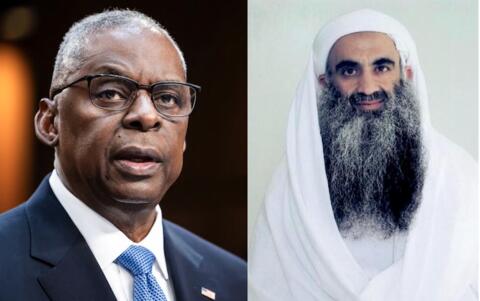US Defense Secretary Lloyd Austin has defended his decision to revoke plea deals for three men accused of plotting the 11 September, 2001 attacks. This move has reignited the 9/11 plea deal controversy, raising questions about the legal proceedings surrounding one of the most significant events in American history.
The Pentagon had announced on 31 July that plea agreements were reached with three of the five alleged plotters held at the Guantanamo Bay detention center. These deals involved Khalid Shaikh Mohammad, the alleged mastermind, along with accomplices Walid bin Attash and Mustafa al-Hawsawi. The agreements were described as “pretrial agreements,” with reports suggesting that the men would plead guilty in exchange for life sentences instead of the death penalty.
Defense Secretary’s Justification
Speaking publicly for the first time about his decision on Tuesday, Austin emphasized the gravity of his choice. He stated, “It wasn’t a decision that I took lightly,” adding that he made the call to honor the scale of loss that occurred on September 11, 2001. Austin expressed his long-held belief that the families of the victims, service members, and the American public deserve to see military commission trials carried out.
This stance aligns with the sentiments of some victims’ family members and Republican lawmakers who had expressed outrage at the initial plea deals, accusing the Biden administration of treating the defendants too leniently.
Unexpected Decision and Its Implications
The revocation of the plea deals came as a surprise to many, including Austin himself. Pentagon press secretary Sabrina Singh revealed that the defense secretary was not consulted on the decision to enter into the plea agreements. This lack of communication highlights potential issues within the military justice system and the handling of high-profile cases.
The withdrawal of the deals was announced in a terse letter from Austin, which also relieved Susan Escallier, the official in charge of the military commission who had signed off on the agreements, of her authority to enter into pre-trial agreements. Austin has now assumed responsibility for these decisions in the case.
Reactions and Criticisms
The initial plea bargains had been welcomed by some legal experts as the only feasible way to resolve the long-stalled 9/11 cases. J Wells Dixon, a lawyer at the Center for Constitutional Rights, criticized Austin’s reversal, accusing him of “bowing to political pressure and pushing some victim family members over an emotional cliff.”
The White House has distanced itself from the plea deal process. National Security Adviser Jake Sullivan confirmed that the Biden administration had no role in the plea bargains, stating that they learned about the deals on the same day they were announced.
As the 9/11 plea deal controversy continues to unfold, it raises important questions about the balance between justice, national security, and the rights of the accused. The decision to revoke the plea deals has reignited debates about the effectiveness and fairness of the military commission system at Guantanamo Bay.
The case of the 9/11 plotters has been mired in legal complexities for years, with the defendants facing trial in a military court at the maximum-security facility in Cuba. The recent developments add another layer of intricacy to an already complicated legal process.
The revocation of the 9/11 plea deals by Defense Secretary Austin marks a significant moment in the ongoing pursuit of justice for the September 11 attacks. As the 9/11 plea deal controversy continues to evolve, it remains to be seen how this decision will impact the future of the trials and the broader implications for military justice. The coming months will likely see further discussions and debates surrounding this complex and emotionally charged issue.
For More Updates
1.https://x.com/secdef?lang=en
















